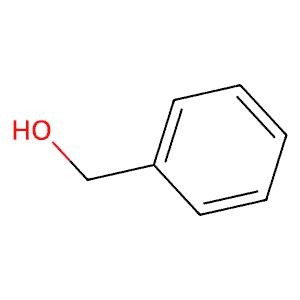
Contents
benzyl alcohol
Benzyl alcohol is used topically in creams and ointments to relieve pain from cold sores, blisters, and gum irritations. It is also used to treat head lice infestation.
Benzyl alcohol is an aromatic compound with antiseptic and anesthetic properties. It forms a protective antiseptic film and acts as a local anesthetic when applied to canker sores or gums. When applied to the scalp and hair, it suffocates lice without affecting their eggs.
In addition to pain relief, benzyl alcohol is used as a preservative in pharmaceutical and cosmetic preparations, as a solubilizing agent, and as a component of disinfectant solutions. It is also used as a local anesthetic to reduce pain during injections and to prevent infection in intravascular catheters.
In adults, benzyl alcohol is metabolized into benzoic acid and eliminated in the urine. However, in newborns, especially preterm babies, the liver is not fully mature and cannot metabolize benzyl alcohol effectively. This can lead to the accumulation of benzyl alcohol and benzoic acid, resulting in "gasping syndrome," a condition that can be fatal.
Warnings
- Do not use benzyl alcohol if you are hypersensitive to any of the components.
- Avoid using benzyl alcohol in neonates, as it can cause gasping syndrome.
- Use benzyl alcohol oral gel with caution in children over 2 years old.
- Benzyl alcohol oral ointment is not intended for use in children.
- Avoid using benzyl alcohol lotion for head lice in children under 6 months old. Use with caution in older children.
- Benzyl alcohol may cause contact dermatitis. Discontinue use if you develop symptoms.
Side Effects
Common side effects of benzyl alcohol include itching, redness, pain, irritation, reduced sensation, and loss of sensation at the application site.
Seek medical attention immediately if you experience any of the following symptoms or serious side effects:
- Fast or pounding heartbeats, chest fluttering, shortness of breath, sudden dizziness
- Severe headache, confusion, slurred speech, severe weakness, vomiting, loss of coordination, feeling unsteady
- Severe nervous system reactions such as stiff muscles, high fever, sweating, confusion, fast or uneven heartbeats, tremors, feeling like you might pass out
- Serious eye symptoms such as blurred vision, tunnel vision, eye pain or swelling, or seeing halos around lights
This is not a complete list of all side effects or adverse reactions. Contact your doctor or report any side effects to the FDA.
IMAGES
Dosages
Gel, Mouth/Throat
- Zilactin: 10% (7.1 g)
Lotion, External:
- Ulesfia: 5% (227 g)
Ointment, Mouth/Throat (Only Adults)
- AverTeaX: 1% (7.4 mL)
For adults and children over 2 years old:
- Apply gel to affected area up to 4 times daily. Do not use for longer than 7 days in pediatric patients.
- Apply ointment to affected area as needed.
For head lice:
For adults and children over 6 months old:
- Apply topical lotion to dry hair and scalp. Leave on for 10 minutes, then rinse thoroughly with water. Repeat in 7 days.
Administration
- Gel: Dry affected area and apply with a moistened cotton swab or clean finger. Allow to dry for 30 to 60 seconds. Do not peel off the protective film. To remove the film, apply another coat of benzyl alcohol and immediately wipe the area with a moist gauze pad or tissue.
- Lotion: Apply to dry hair until completely saturated. Leave on for 10 minutes, then rinse thoroughly with water. Avoid contact with eyes. Wash hands after application. Use in conjunction with a lice management program.
- Ointment (Only adults): Apply at the first sign of symptoms.
Overdose
- Overdose of benzyl alcohol in adults can cause irritation, allergic contact dermatitis, and central nervous system depression leading to hypotension, convulsion, paralysis, and respiratory failure.
- The minimum toxic amount for newborn infants is unknown. Exposing newborns to benzyl alcohol and its metabolites can cause gasping syndrome, metabolic acidosis, and organ damage.
- Toxicity treatment involves discontinuing exposure and providing supportive care. Hemodialysis may help eliminate benzyl alcohol and correct severe metabolic acidosis.
Drug Interactions
Inform your doctor of all medications you are currently taking to avoid any possible drug interactions.
- Benzyl alcohol has no known severe, serious, moderate, or mild interactions with other drugs.
The drug interactions listed above are not exhaustive. For more information, consult a healthcare professional.
Pregnancy and Breastfeeding
- There are no well-controlled studies on the use of benzyl alcohol during pregnancy or breastfeeding. However, topical use is likely safe.
- Topical use of benzyl alcohol is not expected to result in exposure to the fetus or breastfed infant.
Additional Information
- Follow the label instructions for OTC benzyl alcohol products. Do not exceed recommended amounts or durations.
- Avoid contact with the eyes and flush thoroughly if accidental exposure occurs.
- Do not use benzyl alcohol for more than 7 days unless instructed by your doctor.
- Discontinue use of OTC benzyl alcohol if your condition worsens or does not improve within 7 days, or if you develop swelling, rash, or fever.
Subscribe to MedicineNet’s Skin Care & Conditions Newsletter
By clicking "Submit," you agree to the MedicineNet Terms and Conditions and Privacy Policy. You also agree to receive emails from MedicineNet, and you can opt-out at any time.
Summary
Benzyl alcohol is used topically to relieve pain from cold sores, blisters, and gum irritations, as well as to treat head lice infestation. Common side effects include itching, redness, pain, irritation, reduced sensation, and loss of sensation. Seek medical attention for serious side effects. Use OTC benzyl alcohol products according to the label instructions and discontinue use if symptoms worsen or do not improve.


